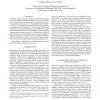Free Online Productivity Tools
i2Speak
i2Symbol
i2OCR
iTex2Img
iWeb2Print
iWeb2Shot
i2Type
iPdf2Split
iPdf2Merge
i2Bopomofo
i2Arabic
i2Style
i2Image
i2PDF
iLatex2Rtf
Sci2ools
ICASSP
2010
IEEE
2010
IEEE
Power law discounting for n-gram language models
We present an approximation to the Bayesian hierarchical PitmanYor process language model which maintains the power law distribution over word tokens, while not requiring a computationally expensive approximate inference process. This approximation, which we term power law discounting, has a similar computational complexity to interpolated and modified Kneser-Ney smoothing. We performed experiments on meeting transcription using the NIST RT06s evaluation data and the AMI corpus, with a vocabulary of 50,000 words and a language model training set of up to 211 million words. Our results indicate that power law discounting results in statistically significant reductions in perplexity and word error rate compared to both interpolated and modified Kneser-Ney smoothing, while producing similar results to the hierarchical Pitman-Yor process language model.
| Added | 06 Dec 2010 |
| Updated | 06 Dec 2010 |
| Type | Conference |
| Year | 2010 |
| Where | ICASSP |
| Authors | Songfang Huang, Steve Renals |
Comments (0)

